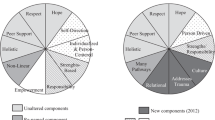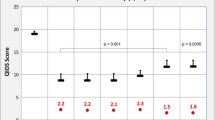Abstract
Background
Recent research demonstrated the potential of psychedelic drugs as treatment for depression and death-related anxiety and as an enhancement for well-being. While generally positive, responses to psychedelic drugs can vary according to traits, setting, and mental state (set) before and during ingestion. Most earlier models explain minimal response variation, primarily related to dosage and trust, but a recent study found that states of surrender and preoccupation at the time of ingestion explained substantial variance in mystical and adverse psilocybin experiences.
Objectives
The current study sought to replicate the previous model, extend the model with additional predictors, and examine the role of mystical experience on positive change.
Method
A hierarchical regression model was created with crowdsourced retrospective data from 183 individuals who had self-administered psilocybin in the past year. Scales explored mental states before, during, and after psilocybin ingestion, relying on open-ended memory prompts at each juncture to trigger recollections. Controlled drug administration was not employed.
Results
This study replicated the previous model, finding a state of surrender before ingestion a key predictor of optimal experience and preoccupation a key predictor of adverse experience. Additional predictors added to the explanatory power for optimal and adverse experience. The model supported the importance of mystical experiences to long-term change.
Conclusion
Mental states of surrender or preoccupation at the time of ingestion explain variance in mystical or adverse psilocybin experiences, and mystical experiences relate to long-term positive change. The capacity to recognize this optimal preparatory mental state may benefit therapeutic use of psilocybin in clinical settings.
Similar content being viewed by others
References
Barrett FS, Johnson MW, Griffiths RR (2015) Validation of the revised mystical experience questionnaire in experimental sessions with psilocybin. J Psychopharmacol 29:1182–1190. https://doi.org/10.1177/0269881115609019
Barrett FS, Bradstreet MP, Leoutsakos J-MS, Johnson MW, Griffiths RR (2016) The challenging experience questionnaire: characterization of challenging experiences with psilocybin mushrooms. J Psychopharmacol 30:1279–1295. https://doi.org/10.1177/0269881116678781
Barrett FS, Johnson MW, Griffiths R (2017) Neuroticism is associated with challenging experiences with psilocybin mushrooms. Personal Individ Differ 117:155–160
Bradstreet MP, Johnson MW, MacLean KA, Griffiths RR (2014) Characterization of challenging experiences (i.e., bad trips) after ingesting psilocybin. Drug Alcohol Depend 140:e18–e19. https://doi.org/10.1016/j.drugalcdep.2014.02.072
Burdzy DC (2014) Sacred emotions scale., Bowling Green State University
Carbonaro TM, Bradstreet MP, Barrett FS, MacLean KA, Jesse R, Johnson MW, Griffiths RR (2016) Survey study of challenging experiences after ingesting psilocybin mushrooms: acute and enduring positive and negative consequences. J Psychopharmacol 30:1268–1278. https://doi.org/10.1177/0269881116662634
Carhart-Harris R (2017) Personal communication regarding new findings from his lab
Carhart-Harris R et al (2016a) Psilocybin with psychological support for treatment-resistant depression: an open-label feasibility study. Lancet Psychiatry 3:619–627. https://doi.org/10.1016/S2215-0366(16)30065-7
Carhart-Harris R et al (2016b) The paradoxical psychological effects of lysergic acid diethylamide (LSD). Psychol Med 46:1379–1390. https://doi.org/10.1017/S0033291715002901
Carhart-Harris R et al (2016c) The paradoxical psychological effects of lysergic acid diethylamide (LSD). Psychol Med 46:1379–1390. https://doi.org/10.1017/S0033291715002901
Cohen S (1960) Lysergic acid diethylamide: side effects and complications. J Nerv Ment Dis 130:30–40
Diener E, Wirtz D, Tov W, Kim-Prieto C, Choi D, Oishi S, Biswas-Diener R (2010) New well-being measures: short scales to assess flourishing and positive and negative feelings. Soc Indic Res 97:143–156. https://doi.org/10.1007/s11205-009-9493-y
Dittrich A (1998) The standardized psychometric assessment of altered states of consciousness (ASCs) in humans. Pharmacopsychiatry 31:80–84. https://doi.org/10.1055/s-2007-979351
Friedman L, Wall M (2005) Graphical views of suppression and multicollinearity in multiple linear regression. Amer Statistician 59(2):127–136. https://doi.org/10.1198/000313005X41337
Garcia-Romeu A, Griffiths RR, Johnson MW (2014) Psilocybin-occasioned mystical experiences in the treatment of tobacco addiction. Current Drug Abuse Reviews 7:157–164
Goldberg LR (1992) The development of markers for the big-five factor structure. Psychol Assess 4:26–42. https://doi.org/10.1037/1040-3590.4.1.26
Green JP, Lynn SJ (2010) Hypnotic responsiveness: expectancy, attitudes, fantasy proneness, absorption, and gender. Int J Clin Exp Hypn 59:103–121. https://doi.org/10.1080/00207144.2011.522914
Griffiths R, Richards W, McCann U, Jesse R (2006) Psilocybin can occasion mystical-type experiences having substantial and sustained personal meaning and spiritual significance. Psychopharmacol 187:268–283. https://doi.org/10.1007/s00213-006-0457-5
Griffiths R, Richards WA, Johnson MW, McCann UD, Jesse R (2008) Mystical-type experiences occasioned by psilocybin mediate the attribution of personal meaning and spiritual significance 14 months later. J Psychopharmacol 22:621–632. https://doi.org/10.1177/0269881108094300
Griffiths R, Johnson M, Richards W, Richards B, McCann U, Jesse R (2011) Psilocybin occasioned mystical-type experiences: immediate and persisting dose-related effects. Psychopharmacol 218:649–665. https://doi.org/10.1007/s00213-011-2358-5
Griffiths RR, Johnson MW, Richards WA, Richards BD, Jesse R, MacLean KA, Barrett FS, Cosimano MP, Klinedinst MA (2018) Psilocybin-occasioned mystical-type experience in combination with meditation and other spiritual practices produces enduring positive changes in psychological functioning and in trait measures of prosocial attitudes and behaviors. J Psychopharmacol 32:49–69. https://doi.org/10.1177/0269881117731279
Grob CS, Danforth AL, Chopra GS, Hagerty M, McKay CR, Halberstadt AL, Greer GR (2011) Pilot study of psilocybin treatment for anxiety in patients with advanced-stage cancer. Arch Gen Psychiatry 68:71–78. https://doi.org/10.1001/archgenpsychiatry.2010.116
Haijen E, Kaelen M, Roseman L, Carhart-Harris R, Russ SL (2018) Predicting responses to psychedelics: a prospective study. Front Pharmocol 9. https://doi.org/10.3389/fphar.2018.00897
Hartogsohn I (2016) Set and setting, psychedelics and the placebo response: an extra-pharmacological perspective on psychopharmacology. J Psychopharmacol 20:1259–1267
James W (1902) The varieties of religious experience: a study in human nature. Longmans, Green and Co, New York. https://doi.org/10.1037/10004-000
Johnson MW, Richards WA, Griffiths RR (2008) Human hallucinogen research: guidelines for safety.(clinical report). J Psychopharmacol 22:603–620
Leary T, Litwin GH, Metzner R (1963) Reactions to psilocybin administered in a supportive environment. J Nerv Ment Dis 137:561–573
Liechti ME, Dolder PC, Schmid Y (2017) Alterations of consciousness and mystical-type experiences after acute LSD in humans. Psychopharm 234(9-10):1499–1510. https://doi.org/10.1007/s00213-016-4453-0
MacLean KA, Johnson MW, Griffiths RR (2011) Mystical experiences occasioned by the hallucinogen psilocybin lead to increases in the personality domain of openness. J Psychopharmacol 25:1453–1461. https://doi.org/10.1177/0269881111420188
Moreno FA, Wiegand CB, Taitano EK, Delgado PL (2006) Safety, tolerability, and efficacy of psilocybin in 9 patients with obsessive-compulsive disorder. J Clin Psychiatry 67:1735–1740. https://doi.org/10.4088/JCP.v67n1110
Nour MM, Evans L, Nutt D, Carhart-Harris R (2016) Ego-dissolution and psychedelics: validation of the Ego-dissolution inventory (EDI). Front Hum Neurosci 10:269–269. https://doi.org/10.3389/fnhum.2016.00269
Phelps J (2017) Developing guidelines and competencies for the training of psychedelic therapists. J Humanist Psychol 57:450–487
Roseman L, Nutt D, Carhart-Harris R (2018) Quality of acute psychedelic experience predicts therapeutic efficacy of psilocybin for treatment-resistant depression Front Pharmacol 8
Russ SL, Elliott MS (2017) Antecedents of mystical experience and dread in intensive meditation. Psychol Conscious (Wash DC) 4:38–53. https://doi.org/10.1037/cns0000119
Russ SL, Carhart-Harris R, Maruyama G, Elliott M (2019) States and traits related to the quality and consequences of psychedelic experiences. Psychol Conscious (Wash DC) 6:1–21. https://doi.org/10.1037/cns0000169
Sanches R et al (2016) Antidepressant effects of a single dose of ayahuasca in patients with recurrent depression: a spect study. J Clin Psychopharmacol 36:77–81. https://doi.org/10.1097/jcp.0000000000000436
Schmid Y, Liechti ME (2018) Long-lasting subjective effects of LSD in normal subjects. Psychopharmacology 235:535–545. https://doi.org/10.1007/s00213-017-4733-3
Studerus E (2012) Tolerability, assessment, and prediction of psilocybin-induced altered states of consciousness. University of Zurich
Studerus E, Gamma A, Kometer M, Vollenweider FX (2012) Prediction of psilocybin response in healthy volunteers. PLoS One 7:e30800. https://doi.org/10.1371/journal.pone.0030800
Tellegen A, Atkinson G (1974) Openness to absorbing and self-altering experiences ('absorption'), a trait related to hypnotic susceptibility. J Abnorm Psychol 83:268–277. https://doi.org/10.1037/h0036681
Wagner M, Mithoefer M, Mithoefer A, MacAulay R, Jerome L, Yazaar-Klosinski B, Doblin R (2017) Therapeutic effect of increased openness: investigating mechanism of action in MDMA-assisted psychotherapy. J Psychopharmacol 31:967–974
Acknowledgements
The authors wish to acknowledge Dr. Auke Tellegen’s contributions to the conceptualization of this study.
Funding
The authors received no financial support for the research, authorship, and/or publication of this article.
Author information
Authors and Affiliations
Corresponding author
Ethics declarations
Ethical review
This study was approved by the Institutional Review Board at Dickinson State University on May 5, 2016 and assigned ID number DSU201604.
Conflict of interest
In April 2017, months after this study was complete, Eleusis, Inc. purchased rights to include the surrender scale as part of an algorithm to predict response to psychedelic therapy. No financial support was received for conducting this study. The authors attest to the integrity of the data and analysis and can provide raw data in direct download from the survey source to support this statement.
Additional information
Publisher’s note
Springer Nature remains neutral with regard to jurisdictional claims in published maps and institutional affiliations.
Electronic supplementary material
Rights and permissions
About this article
Cite this article
Russ, S.L., Carhart-Harris, R.L., Maruyama, G. et al. Replication and extension of a model predicting response to psilocybin. Psychopharmacology 236, 3221–3230 (2019). https://doi.org/10.1007/s00213-019-05279-z
Received:
Accepted:
Published:
Issue Date:
DOI: https://doi.org/10.1007/s00213-019-05279-z




